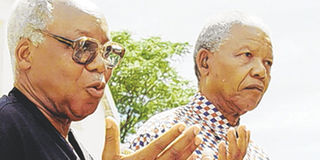Greed would have deeply upset Mwalimu

Father of the Nation, Mwalimu Julius Nyerere (left) speaks at an official function, beside South Africa anti-apartheid icon Nelson Mandela. PHOTO | FILE
What you need to know:
Had he been alive, Mwalimu, whose 16th death anniversary his compatriots are marking today, some of his observations during the lead-up to the October 25 General Election would be nightmarish.
Excessively greedy individuals can sell their mothers in order to attain ridiculous ambitions. So remarked Mwalimu Nyerere at a rally in Dar es Salaam once, on one of the occasions when his temper was at its fiercest.
Had he been alive, Mwalimu, whose 16th death anniversary his compatriots are marking today, some of his observations during the lead-up to the October 25 General Election would be nightmarish.
The application of money to win support and votes, as well as being contracted to campaign for candidates, would shock him tremendously.
He would recall having long cautioned wananchi to be wary of people pursuing an overzealous Ikulu-entry agenda, posing three questions which are featured in currently popular video clips:
• Where did a wealthy presidential aspirant get so much money?
• If he borrowed it, how would he repay the campaign fund loans?
• What would happen if he failed to do so?
The collective answer revolved around whoever could become president, who is supposed to personify ‘Servant of the People Number One’, manipulating the most powerful office in the land to plunder the nation’s financial and other resources.
We have witnessed, during the campaign season now in its sunset, how financial might and material wealth have been touted as noble endowments, and how opportunists worship drivers of the phenomenon.
Nyerere, a staunch stickler to principles who expected those he led as national party chairman to be conformists, would have been puzzled by the rampant ‘principle-less-ness’ in political parties, including CCM.
Much as there were murmurs of intimidation, unfair play, and even dictatorship in the decision-making organs, from the grassroots upwards, there were efforts within CCM, to uphold the principle of criticism and self-criticism.
But absolute democracy in a single-party setting was near-impossible, and so, a frustrated member had no option but to remain stuck with the entity half-heartedly.
Another option was to put up a pretence of being a member by constantly updating annual subscriptions, and making occasional technical appearances at meetings, to avoid being perceived as a traitor.
The scenario was imperfect and could be remedied only by embracing a multi-party political model.
Given long, deeply entrenched single-party supremacy, exemplified by Tanu, Afro-Shiraz and CCM, a product of the merger of the first two in 1977, Chief Justice Francis Nyalalali Commission’s 1992 report showed that, many respondents were unsure of the benefits of the envisaged multi-party system.
Mwalimu’s views, channeled through his tremendous convincing power, were instrumental in psyching wananchi on the inevitability and benefits of a multi-party system.
In 1990, against the backdrop of the collapse of the Soviet Union in the late 1980s, he said Tanzania would not be spared of the democratic changes that had been sweeping the globe.
He was quoted as saying: “When you see your neighbour being shaved, wet your head to avoid a dry shave. The one party system is not Tanzania’s ideology, and having one party is not God’s will. The party has its own limitations.”
In subsequent remarks, after multi-partyism had been formally introduced on July 1, 1992, Nyerere predicted that, a viable opposition would be an off-shoot of CCM. He noted, too, that, those who would be disenchanted by negative tendencies in CCM would find solace in viable entities in the opposition camp.
His prediction was partly been borne out by the vibrancy injected into opposition politics by the likes of Mr Augustino Lyatonga Mrema (initially) and former Chadema secretary-general Willibrod Slaa, previously CCM cadres.
They did, in 1995 and 2010 presidential elections, respectively, shake CCM considerably, under the National Convention for Construction and Reform (NCCR-Mageuzi) and Chadema flags.
Incidentally, Mwalimu’s son Charles Makongoro, upset by some nasty goings-on within CCM, defected to, and contested the Arusha Urban parliamentary constituency seat on an NCCR-Mageuzi ticket in 1995. He later rejoined CCM.
Mwalimu would have been sickened by the senselessness of a CCM member whose bid for nomination to contest a given position flops, complains bitterly about alleged anti-democratic practices and defects to the opposition.
But there, he secures candidacy under a system that forbids anyone else to contest.
The same applies to defections in the opposite direction for purely opportunistic ends, which, as alluded earlier, can prompt someone to sell one’s own mother !
Nyerere would furthermore be upset by whipping religious and tribal sentiments as vote-attracting baits.
He would shake his head, tilt it skyward and whisper: “My God, what has become of my beloved country?”




